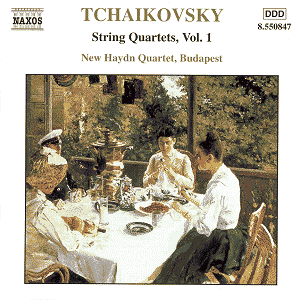The Tchaikovsky quartets are hard to bring off successfully.
In a market not exactly short of recordings it’s remarkable how few
are genuinely distinctive and have lasted the test of time. The Borodin
Quartet, on Teldec 2292-45965-2 or Melodiya 74321 18290-2, have recorded
all three quartets; the Hollywood Quartet’s 1952 traversal of No 1 is
back in the catalogue on Testament; and quartet rivals to the east of
Budapest, location of the present disc, include the Shostakovich, the
St Petersburg and the Moscow.
Now the New Haydn Quartet, Budapest – a somewhat unwieldy
name – opens their account with the first two quartets. Presumably volume
two will include the third quartet, the Quartet Movement in B flat and
maybe the Five Early pieces for quartet (though many quartets opt to
play the Souvenir de Florence for sextet). The Op 11 quartet’s nationalism
is tempered by its traditional and orthodox affiliations; its first
movement, Moderato e semplice, can often seem hamstrung by an
excessively slow tempo. The New Haydn Quartet, Budapest, steer a course
between the lugubrious and the brusque and are sufficiently forward
moving to avoid the heaviness which afflicts several other recordings.
The Andante cantabile is suffused with the requisite warmth;
the Scherzo heavy footed in its stomping episodes. If the outer
movements of the quartet never quite resolve then it is not entirely
the fault of the Hungarians – Tchaikovsky’s invention is not uniform
throughout the work.
The Second Quartet, Op 22, is by some way the least
recorded of the three. Less popular than the first, less obviously powerful
than the third it is nevertheless formally and expressively a compelling
piece. Well though they do play the New Haydn Quartet is no match for
the Borodin Quartet, whose fusion of exemplary technical address, expressive
nuance, control of dynamics and organization of tempo relationships
is surely unmatched by any other quartet in this repertoire. The New
Haydn Quartet addresses the piece’s Mozartian allusions with commitment,
however, and although they are not as tonally alluring as they might
be theirs is by no means a negligible account.
The First Violin, Janos Horvath, tends to dominate
the aural spectrum; the recorded sound is pleasant though, as recorded
in the Unitarian Church, Budapest, not of ideal bloom, tending to the
spatial. Notes are good. Recommendation must remain with the Borodin;
I prefer their Melodiya recordings though many will welcome the perceived
increase in spontaneity of their live Teldec account. But Naxos has
given us a reasonable and plausible cheap alternative.
Jonathan Woolf
See also
review by John Phillips

![]() New Haydn Quartet, Budapest
New Haydn Quartet, Budapest
![]() NAXOS 8.550847 (66.35)
NAXOS 8.550847 (66.35)